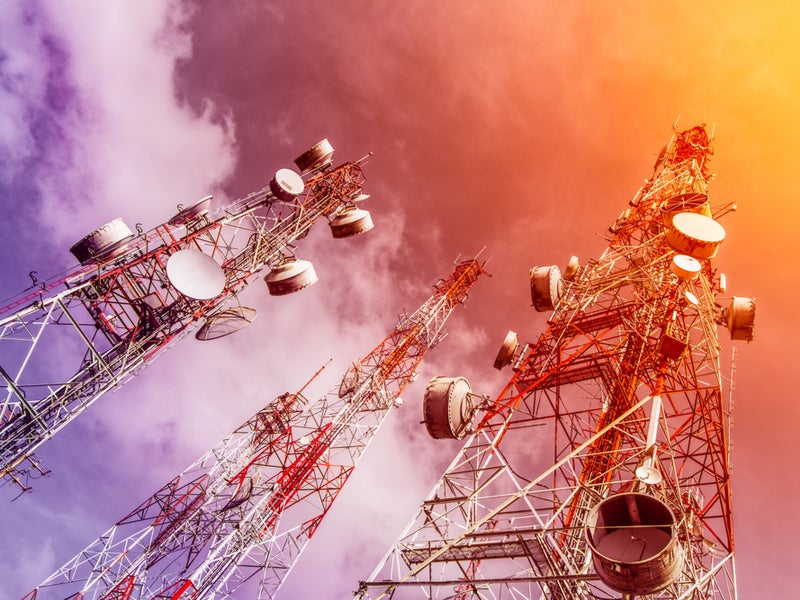
5G leads as Verdict lists the top five terms tweeted on telecommunications in July 2020, based on data from GlobalData’s Influencer Platform. The top tweeted terms are the trending industry discussions happening on Twitter by key individuals (influencers) as tracked by the platform.
1. 5G – 714 mentions
Deriving strategic value from 5G, the ban of equipment makers in 5G trials, and tech innovations, were popularly discussed topics during the month of July. According to an article shared by Antonio Grasso, a digital transformation advisor, organisations needed to have a clear picture of where their technological portfolio will be challenged most and to derive the maximum value from 5G.
Ajit Pai, the chairman of the Federal Communications Commission (FCC), meanwhile, discussed the government of India’s plans to ban Chinese equipment makers from participating in the country’s 5G trials and its eventual auction.
In other news, Fabrizio Bustamante, an entrepreneur, shared an article on the use cases of IoT, 5G, augmented and mixed reality, in the next level of displays in the Mercedes Benz.
Organizations need a clear picture of where their current technology portfolio would be challenged by the use cases they want to pursue – How to get strategic value from 5G?
Full report by @Capgemini Link>> https://t.co/aVI9X6ZFEM @Capgemini via @antgrasso @antgrasso_IT #5G pic.twitter.com/J3ugtOSwQR
How well do you really know your competitors?
Access the most comprehensive Company Profiles on the market, powered by GlobalData. Save hours of research. Gain competitive edge.
 Company Profile – free sample
Company Profile – free sampleThank you!
Your download email will arrive shortly
Not ready to buy yet? Download a free sample
We are confident about the unique quality of our Company Profiles. However, we want you to make the most beneficial decision for your business, so we offer a free sample that you can download by submitting the below form
By GlobalData— Antonio Grasso (@antgrasso) July 19, 2020
2. IoT – 180 mentions
The application of the technology across industries such as healthcare, automotive, and others, were popularly discussed topics during the month. According to an article shared by Evan Kirstel, a top B2B influencer, companies such as IBM and Verizon have been collaborating to develop 5G enabled IoT technologies for the industrial sector. The aim of the companies is to integrate these technologies to make applications more cost-effective, the article noted.
Ronald van Loon, a top technology influencer, further discussed the benefits of integrating IoT with enterprise mobility management. The integration can provide a myriad of benefits such as enterprises’ ability to respond more quickly to market trends, security, and better predictions, among others.
In other news, Dez Blanchfield, a chief data scientist and market analyst, discussed how 5G networks will have to provide an industrial IoT exposure interface that is simpler to use than service-provider-oriented exposure interfaces. Such an interface will provide enterprises with process automation, production logistics, and applications that require more reliability, latency, and bandwidth, the article highlighted.
IBM, Verizon partner to develop 5G enabled IoT technologies for industrial sector https://t.co/UXXtZeZzcO @VerizonBusiness @IBMIoT #IoT #IIoT #Industry40
— Evan Kirstel #RemoteWork (@EvanKirstel) July 16, 2020
3. Mobile – 130 mentions
The biggest mobile vendors in the world, and the launch of new solutions for mobile operators seeking to cut costs, improve efficiencies, and manage benefits, were popularly discussed in July. According to an article shared by Mikko Hypponen, a computer security expert and columnist, Huawei has become the biggest mobile phone vendor in the world. The telecom company is selling more devices than any other company, the article further noted.
In other news, Ed Gubbins, a principal analyst, discussed Samsung’s introduction of the fully virtualised 5G vRAN solution for commercial availability in the quarter. The solution consists of a virtualized Central Unit (vCU), a virtualized Distributed Unit (vDU), and other radio units for smooth 5G migration, and is currently in use by mobile carriers in Japan, Korea, and the US, the article highlighted.
According to new data from Canalys, Huawei just became the biggest mobile phone vendor in the world, selling more devices than anyone else. https://t.co/LNff5ESH7a
— @mikko (@mikko) July 30, 2020
4. Networks – 124 mentions
Cloudified 5G network becoming more autonomous and intelligent, and new partnerships for innovation was popularly discussed in July. According to an article shared by Mike Dano, an editorial director for 5G and mobile strategies, DISH Network announced plans on acquiring 13.5MHz of 800MHz spectrum nationwide from T-Mobile for $3.6bn. As per the terms of the agreement, Dish would purchase the spectrum in 2023, while T-Mobile would use a portion of it until 2025, the article noted.
In other news, Ronan Dunne, executive vice president and CEO of Verizon Consumer Group, shared an article on the latest and most affordable 5G phone, the Galaxy A71 5G UW, which gives access to Verizon’s 5G Ultra Wideband network. Verizon’s wideband service is currently available on 15 devices across 35 cities, the article noted.
That Dish Network reiterated its plan to purchase $3.6 billion worth of 800MHz spectrum from T-Mobile underscores the fact that Charlie Ergen – the architect of Dish's #5G strategy – ostensibly has an utterly inexhaustible desire for spectrum. https://t.co/rShfvj2TCP? $DISH
— Mike Dano (@mikeddano) July 7, 2020
5. Smart Phones – 100 mentions
Fierce competition in the smartphone market, new launches, and smartphone shipment performances were popularly discussed in July. According to an article shared by Patrick Moorhead, a top tech industry analyst, Apple’s CEO Tim Cook plans to state that it does not have a dominant share in the smartphone market at the House Antitrust Subcommittee hearing. The company is set to defend its 30% fee on digital products on the App Store, stated to be challenging and inconsistent in many ways, the article noted.
Danish Khan, a telecom journalist, meanwhile, tweeted on Qualcomm providing the chipset for the new JioPhone, a Google and Reliance smartphone collaboration.
In other news, Alvin Foo, a top technology strategist, discussed China’s smartphone shipments in the first half of 2020 to be 149 million, down 16.1% YoY. Huawei topped global shipments in the second quarter of 2020 in China’s smartphone market, followed by competitors Vivo, Oppo, Apple, and Xiaomi, the article highlighted.
One ironic thing I find about @tim_cook statement is that his definition of the smartphone market is different from the one used in suing Qualcomm. Everyone remember the “premium smartphone market” definition? Apple has a monopoly here. https://t.co/KGa4PJR228
— Patrick Moorhead (@PatrickMoorhead) July 29, 2020







Related Company Profiles
Google LLC
Xiaomi Corp
Qualcomm Inc
DISH Network Corp
Apple Inc